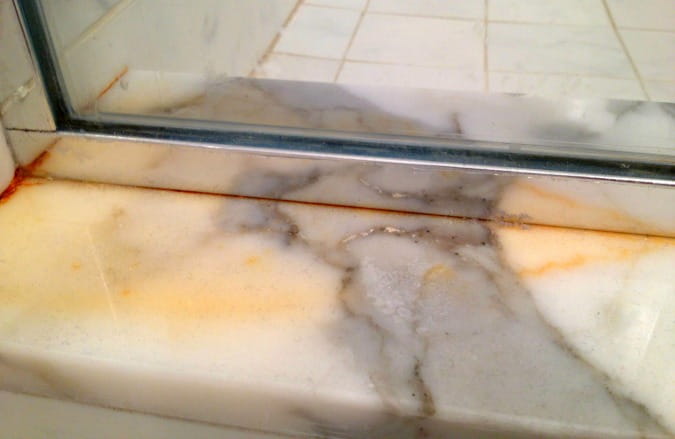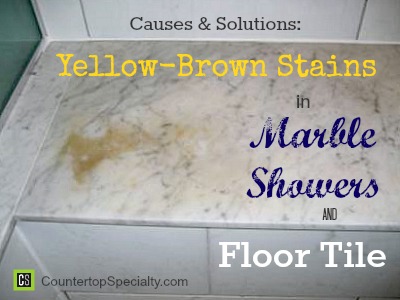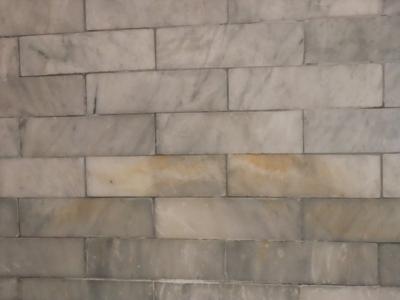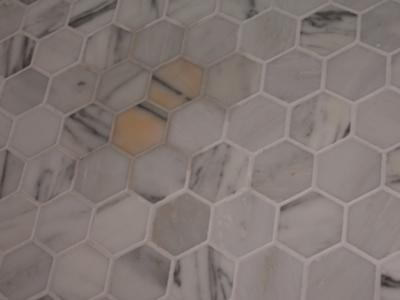Yellow/Brown Stain on Carrara Marble
QUESTION:
Hi, we have White Carrara Marble tile in our steam shower.A yellow-brownish stain has begun to appear on the marble bench slab.
It started out faint, has gotten brighter, and appears to be growing.
ANSWER:
Iron deposits that are embedded in white marble tile (especially Carrara marble) are typically the cause of this type of stain.If these deposits are exposed to water, they can rust and leach through to the surface causing the yellow/brown stains.

Now, the marble would have to get somewhat saturated for this to happen. If water remains on the surface for hours it could absorb enough to rust the iron and then as the rusty water evaporates it is brought back to the surface.
Another cause is water getting trapped underneath the tile (or slab in this case) due to voids or cracks in the grout... or otherwise poor installation.
Rust stains in marble are a bit of a nightmare. Can be tough to remove especially if old and/or deep which is usually the case for stains from embedded iron deposits.
When the yellow-brown rust stain is diffuse, this means it is coming from inside the marble. It can be improved (i.e. the stain reduced or lightened) but often cannot be completely eliminated.
A rust stain with a distinct outline is from something metallic left on the surface. This type can usually be removed.
To remove marble rust stains follow the procedures in the Removing Granite & Marble Stains ebook.
A second option is this Rust Stain Remover Poultice is a eady-to-use product.
But again rust stains are difficult and you'll need to repeat the process several times. Also, the yellow-brown stain will return until you stop the source of water.
So, let the shower dry out completely for a few days, inspect your grout for cracks and fix any voids and note any continued moisture that could indicate a plumbing leak.
Remove the rust stain with one of the above methods.
Sealing white marble shower tile is crucial for preventing rust stains.
If the rust stain continues to return, then most likely you have a faulty install and need to tear it out and start over making sure all seams are perfect and water is not getting trapped under the slab. Or you have a plumbing leak.
Comments for Yellow/Brown Stain on Carrara Marble
|
||
|
||
Yellow Stains on Honed Marble Shower Wall
QUESTION:
Hi, two years ago we had a honed Carrara marble tile shower installed.Over time we are getting some marble staining on the tiles that are most exposed to the water.
Some of the staining, where the tiles are darker I assume is just the result of water penetrating the surface of the marble and indeed it does fade to some extent when the shower isn't used for a day or so.
The stains look like rust as you can see from the attached photo.
In fact, there, is a very high iron content in the water and it is an old house so I would not be surprised if there is rust in the water pipes.
My questions are...
1. Can I clean the staining and...
2. What would you suggest to seal the surface to prevent the problem getting any worse. Many Thanks!
ANSWER:
High iron concentration in the water could have an affect, but the rust-like stains you see can occur with white marble that gets saturated with water.White marble often contains iron deposits that can rust if exposed to a constant source of water.
You see this most often on marble floor tile, but certainly can occur on shower walls if water is getting behind the tiles providing enough moisture to leach into the marble tiles, oxidize the iron deposits within the marble and carry the rusty water to the surface staining the tile.
And cleaning marble rust stains is tricky.
Water can get behind the tiles through voids or cracks in the grout and/or from a bad install. So, inspect the area and repair any damaged areas you find.
Nothing can fix a bad install except a tear out and re-install, but that is a worse-case scenario that I wouldn't worry too much about yet.
However, given the shower spray pattern easily seen in the helpful photo I'd say that in this case your diagnosis of the rusty water is likely correct.
Although if true, I'd expect to see some rust staining on the floor along the main path where the water runs to the drain.
You say the stains fade if the shower is not used for a few days. This is because the marble tile dries out (at least at the surface) which changes the reflectivity of the surface and makes the color appear less saturated.
Wet just about anything and you'll notice the color gets darker.
Of course, you may have a combination of both rusty water and water behind the marble tiles.
Cleaning marble rust stains can be difficult. You'll need to follow the instructions in the Removing Marble Stains Manual.
You'll likely have to repeat the process several times. Do that and re-grout/repair any voids in the grout.
Once the marble stains are removed, you could seal the marble to help eliminate staining from the rusty water, but if water is still getting behind the tiles you could still get rust stains leaching to the surface.
And now the water would be sealed inside the tile, which will cause the marble to break down in time.
But if you successfully repair any voids in the grout, seal the marble and still have the problem return it would be good evidence of a bad install and whether or not the marble was sealed would be mute at that point.
Certainly, you should look at a solution for filtering the water to eliminate iron if possible. Then I'd remove the stains and seal the marble using one of these recommended marble & granite sealers.
Return to Marble Stains Questions & Answers.
Brown Stain in White Marble Shower
QUESTION:
The White/Grey marble on my shower walls is getting veins of brown...how do I fix it?ANSWER:
What you are describing sounds like a problem that is somewhat unique to white marble.White marble often has deposits of iron. If water leaches into the core of the marble tile and contacts these deposits, the iron will rust and bleed to the surface causing brown, orange or yellow spots / marble stains.
Usually the problem occurs in showers and on floors because there is water under or behind the tiles. The water could be from a leak, cracks in a foundation or grout or poor tile installation in a shower allowing water to get behind the tiles.
Water from the shower itself typically will not cause this because it dries out quickly.
It really requires a constant source of moisture to develop the brown or rusty marble stains.
Inspect your shower, especially the grout lines closely for cracks, voids, etc.
If you find cracks in the grout or tile, then do not use the shower for a week to let it dry out thoroughly. Check if you notice any dampness anywhere at this point.
Hopefully you can repair cracks to solve the problem, but you may have to rip it out and re-install it to correct a problem of water getting behind the tile.
One other explanation is that the marble tiles were installed with cement rather than white glue. Sometimes the presence of iron in cements can cause a yellowing.
I'm leaning toward the iron deposits though since it follows the veins.
You may be able to get the stains out using a poultice for rust stains. You'll find complete instructions on how to do this in the Removing Marble Stains Guide.
But this could only be a temporary fix. Again, it usually occurs because of water behind the tile. So, until that problem is fixed, the rust color will continue to bleed through.
I know this answer is a bummer, but if you do find evidence of water behind the tiles, then you may have some recourse with your installer.
Return to Marble Stains Questions & Answers.
White Marble Shower Stain
by Katrina
(Laveen, AZ)
QUESTION:
We have a spot or stain on this white marble 'bench' in our shower that is about 7in x 2in that has yellowed from putting products on it.
The rest of the shower is still beautiful but this area is right at the point where you step into the shower. How can I 'whiten' it back up?
ANSWER:
The yellow marble stain may be from oils and other chemicals in your soaps and shampoos, but there is another possibility...
White marble (I'm assuming it's White Carrara) often contains iron minerals. If subjected to constant moisture the stone could absorb the water and the iron deposits will rust.
The rust will migrate through the stone and eventually show up as yellow marble stains on the surface.
Now you said the rest of the shower looks great... no stains.... so it is probably not a rust problem as described above, but just keep that in mind if the solution I give you doesn't work.
How to remove the stain?
To properly remove a marble stain you must first know what type of substance caused it (oil, organic, biological, metal). Each requires a different "recipe" to fix it.
I'm guessing its either an oil stain or some organic type stain.
You will need to make a poultice which is a mixture of an absorbent substance with a chemical that essentially sucks the stain out of the marble. The chemical used depends on which type of stain.
You'll find complete step-by-step instructions for cleaning marble (and all stone) stains or all types in the Removing Granite & Marble Stains e-book.
A second option / possibility may be that you have soap scum build-up, which usually occurs all around the bottom half of the shower, however, it could be concentrated in the spot where all your soapy products are placed.
Soap scum is a whitish-yellowish film that cannot be cleaned by normal cleaners or methods and thus may lead you to think it is a stain.
You need a specialty marble cleaning product like this Soap Scum / Hard Water Remover that is safe on marble tile. This product will take off any soap film with a little scrubbing. It is also a good product to use for general or regular marble shower cleaning to keep soap film from building up.
Return to Marble Stains Questions & Answers.
Orange Stain On Newly Laid Marble Tiles
by TK
(Australia)
QUESTION:
We just had installed carrara marble hex tiles three days ago, and in some of the tiles, an orange colour has leached through.I'm assuming they have come from the same piece of marble. When the tiles were first installed, I noticed that the colour of all the tiles had changed to a darker shade of grey, but has since returned to its original colour.
I'm not going to seal the tiles until I can find out what the problem is. Do you have any idea what it is or what I can do?
ANSWER:
Sometimes this can occur when the wrong adhesive or setting material is used, but of course you'd see it over the whole floor.Most often when Carrara marble yellows it's because of exposure to significant moisture.
White marble will often contain small deposits of iron. If the marble becomes wet long enough to allow moisture to leach through the marble, the iron deposits will oxidize creating yellow/orange/brown stains.
Usually it this process occurs over a longer period, but if enough moisture it could happen quickly and these tiles are thin.
I'd agree that the two tiles are from the same cut, but also that these tiles were somehow more wet than the others or you'd expect to see at least a few other spots.
You can get the stains out using the procedure in the Removing Stains Manual. Hard to tell by the picture if the marble is honed or polished, but removing rust stains can etch polished marble. So, I'd consider just replacing them.
And you want to wait 2 to 3 weeks after installation to seal floor tile. You need to give enough time to make sure all the tiles have dried out completely and to clean the marble flooring 2 or 3 times to remove all dust and debris.
Comments for Orange Stain On Newly Laid Marble Tiles
|
||
|
||
|
||
Cleaning Brown Stains On Marble Floor
by Sue
(Margate new jerseyk)
QUESTION:
I have a carrara marble bathroom floor. There are dull yellow stains in the high traffic areas. How do I clean it?ANSWER:
Cleaning marble stains is fairly easy in most cases, but it can't be done using conventional cleaning methods since stains occur when a substance is absorbed into the marble below the surface.Also, white marble like Carrara will often contain iron deposits. If the marble tile is exposed to a constant source of water, or if the floor was flooded and water is trapped beneath the tiles it can saturate the marble exposing the iron deposits to water.
When this happens the iron oxidizes and the rusty water is carried to the surface to evaporate leaving brown/yellow/orange stains.
So, if any of the above is a possible cause, then you need to eliminate the source of water if a leak, or make necessary repairs to grout, etc. if water may be getting under the tiles this way.
If a one-time event like a flood, then it's possible that all the water is now dried out and the marble stains were caused all at once.
The one confusing issue is that the stains occur in the traffic path. It's hard to know if this is coincidence or part of the cause.
Another consideration is that some bath mats can contain dyes that will cause marble stains, especially when made of natural materials.
The proper method for cleaning marble stains depends on what stained the marble, so it's helpful (but not absolutely necessary) to know.
You'll find complete step-by-step instructions on how to remove all types of marble stains in the Removing Granite & Marble Stains e-book.
It also details what to do when you are not sure what actually caused the stain.
Comments for Cleaning Brown Stains On Marble Floor
|
||
|
||
|
||
|
||






